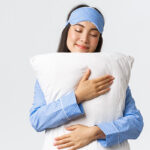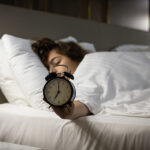How to Measure Sleep Quality
Experiencing tossing and turning, frequent wakeups, restlessness, racing thoughts, and/or chronic all-nighters? If so, it may be time to measure your sleep quality.
Do you wish you could sleep peacefully throughout the night – without waking up 20,000 times a night? Well, you are not alone.
Good sleep quality is imperative for your mental and physical health. Thus, if you want to sleep better at night, awaken the next morning feeling reenergized and refreshed, and stay aware and alert throughout your day, you will need to work on your sleep quality.
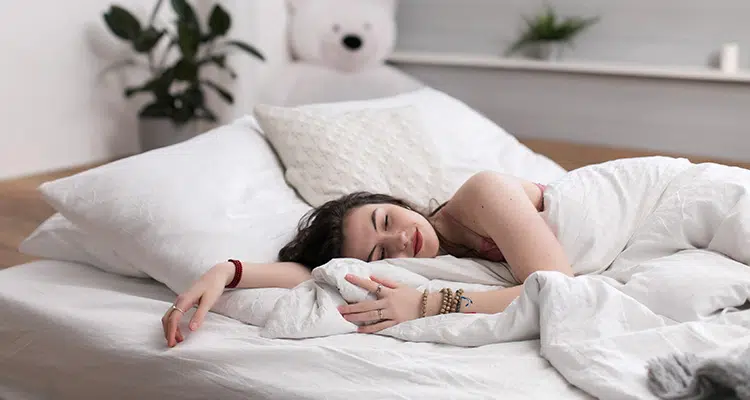
Two factors play a significant role in your overall sleep quality. These factors are:
- The length of time that you typically sleep (the number of hours)
- Your sleep quality (how well you are sleeping)
Keep in mind that just because you are getting the appropriate amount of sleep (7-8 hours) each night, it does not automatically mean you are experiencing good sleep quality. The good news is there are plenty of steps you can take to improve the quality of your sleep. But, the first step is to get an accurate idea of how well you are sleeping.
Understand that sleep quality is just as important, if not more important than sleep quantity (the number of hours you sleep each night). In other words, if the quality of your sleep is poor, it does not matter how long you sleep, you will still be sleep-deprived and very sleepy the next morning. So, to be well-rested you need good sleep quality and a full night of uninterrupted sleep (quantity).
Note: Most adults need between seven and eight hours a night to feel rested and revitalized, however, this depends on how well and how long you sleep at night. A good sleep quality ensures that you function at an optimal level every day.
Content
What is Sleep Quality?
Although a person’s sleep quality is essential to his or her health and well-being, there is currently no standard definition of “sleep quality.” Sleep quality is often defined through self-reports (what good sleep quality means to sleepers). So, the definition of “sleep quality” varies from person to person with some populations defining it differently than others.
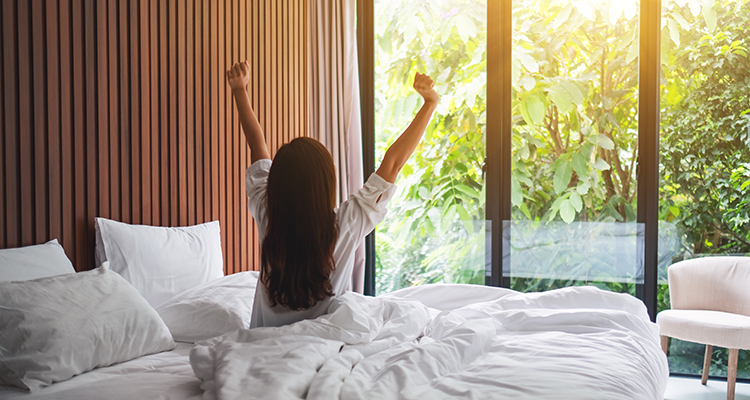
Sleep hygiene (sleep habits), lifestyle choices, needs, and wants also play roles in what some sleepers define as “good quality sleep.” Other factors that also appear to contribute to sleep quality, such as bedroom atmosphere (i.e., temperature, bedtime routine, lights or lack thereof, comfortable bedding, noises, etc.), naps, and sleep disturbances.
How rested and restored you feel upon waking can also influence how you perceive your sleep quality. However, sleep quality and sleep quantity are not directly intertwined. For instance, Mary, a 24-year-old office worker, sleeps for long periods, however, she never feels rested upon waking.
Why does Mary not feel revitalized upon waking? Because she spends most of the night tossing and turning. When she does fall asleep, she usually awakens several times a night. But most nights she experiences primary insomnia, which affects her sleep quality. Disrupted sleep is considered poor sleep quality. But even though sleep quality and sleep quantity involve different measures, both factors play a role in your sleep hygiene.
Is Sleep Quality Important?
Yes!
Sleep quality is very important. Sleep, like breathing, eating, and drinking, is a basic human need. Sleep affects your body’s ability to heal itself. It also plays an important role in your ability to feel rested, restored, refreshed, and reenergized upon waking. Also, when you experience quality sleep, you are less likely to experience daytime drowsiness and fatigue. The quality of your sleep not only promotes good mental and physical health but also impacts your quality of life.
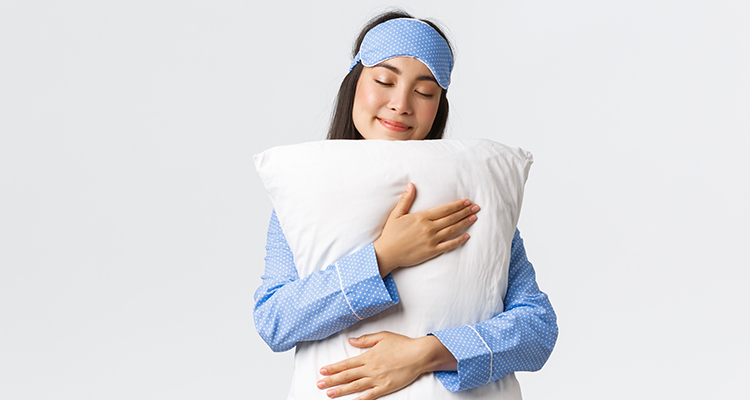
Sleep also plays a role in your growth and development. It is for this reason that babies, toddlers, young children, and teens need more sleep than adults. However, people of all ages need good sleep quality to fight off infections and viruses (like Covid-19) and heal from injuries.
On the flip side, poor sleep quality and sleep deprivation can have a rippling effect on your life – i.e., health, work or school productivity, mood, etc.
Poor sleep can also increase your risk of developing the following health conditions and ailments:
- Stroke
- Autoimmune Condition (i.e., Lupus, Diabetes, Multiple Sclerosis, Asthma, etc.)
- Heart Disease
- High Blood Pressure
- Anxiety
- Depression
Note: Poor quality sleep can even affect your safety and/or the safety of others. For instance, sleep deprivation or not getting quality sleep can lead to “accidents” – car accidents, falls, work accidents, etc. – “accidents” that could lead to injuries or death.
What Tests Are Used to Measure Sleep Quality?
A sleep study, also medically known as polysomnography, can help a sleep specialist or doctor diagnose a sleep disorder like insomnia. Sleep studies can also help improve your sleep quality and daytime functioning. These studies may involve a variety of tests, such as polysomnogram (PSG), a multiple sleep latency test (MSLT), CPAP titration, split night study, and/or maintenance of wakefulness test (MWT).
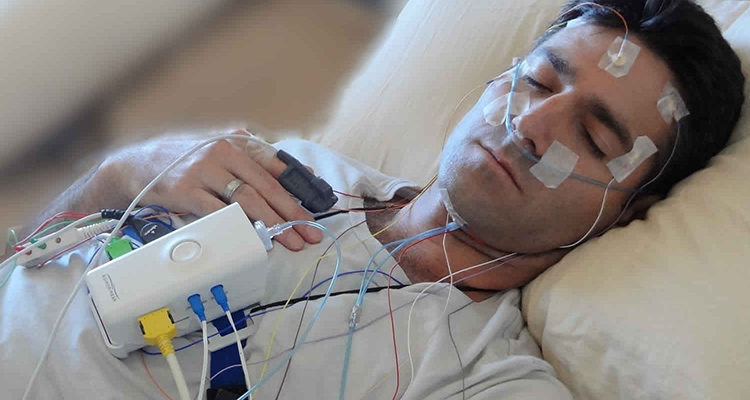
Sleep studies may involve one or more of the following tests:
- Polysomnogram (PSG)
A polysomnogram (PSG) or sleep study is administered, if your doctor or a sleep specialist suspects that you have a sleep disorder (i.e., insomnia). This study is often needed to make a proper diagnosis, so you can receive right treatment for your sleep issues.
A PSG is normally conducted overnight in a sleep clinic or hospital. The purpose of a sleep study is to monitor your sleep/wake cycles, identify any sleep disruptions, and measure the quality of your sleep. It is also designed to analyze your brain function, breathing rate, and muscle activity.
- Multiple Sleep Latency Test (MSLT)
A multiple sleep latency test (MSLT) is used to pinpoint the cause of your daytime grogginess and fatigue. It also measures the length of time it takes you to fall asleep during the day.
The MSLT can diagnose various conditions, such as narcolepsy and idiopathic hypersomnia. This test is conducted over a full day and consists of multiple mini-assessments. During this time, you are encouraged to take a total of five pre-scheduled naps – naps every two hours. The overall goal of an MSLT is to measure the length of time it takes you to fall asleep once it is time to go to bed (nighttime).
- CPAP Titration
Continuous positive airway pressure titration (CPAP titration) is used to assess sleep-related breathing conditions, such as sleep apnea and hypoventilation. Once you have been diagnosed with one of the sleep disorders listed above, you can participate in a CPAP titration study. And, after your doctor or sleep specialist receives the results of the CPAP titration, treatment can begin. A CPAP titration study is normally conducted overnight in a sleep clinic.
During this test, your breathing rate is monitored and your CPAP pressure is adjusted, as needed, to ensure that you get the proper amount of air while asleep. Thus, the purpose of this test is to make sure you do not have any airway blockages preventing you from getting sound sleep. A CPAP titration measures your heart and breathing rates, oxygen levels, delta “brain” waves, and arm and leg movements throughout the night.
- Split Night Study
A split night study can be a suitable alternative for insomniacs, who are suffering from severe sleep apnea. This test is used to diagnose sleep apnea and assess continuous positive airway pressure (CPAP) during one night. The goal of a split night study is to hasten the amount of time it takes for you to receive treatment. So, during the first part of the night, you are given polysomnography (a sleep study).
During the second part of the study, CPAP titration is administered to you. A split night study is designed to identify your positive airway pressure (PAP). A PAP provides a steady stream of compressed air for you, so you experience improvements in your sleep quality.
- Maintenance of Wakefulness Test (MWT)
A maintenance of wakefulness test (MWT) can evaluate your ability to stay awake at different intervals. An MWT is typically conducted over a full day a sleep clinic. The purpose of this test is to measure your wakefulness and alertness during the day. It is also designed to measure your ability to stay awake in a relaxing, quiet, and non-stimulating atmosphere for a certain amount of time.
This test involves 2-4 forty-minute daytime trials in a dimly lit and quiet bedroom. You are then instructed to look straight ahead while remaining still – not doing anything that can stimulate you or keep you awake, such as playing on your smartphone, watching television, singing, or talking.
How is Sleep Quality Measured?
Sleep quality measures how well you are sleeping at night. More specifically, it determines if your sleep is peaceful and therapeutic. Sleep quality is not the same as sleep satisfaction. Sleep satisfaction refers to your perception of your sleep. For instance, if you feel rested and reenergized when you awaken in the mornings, you may describe your sleep quality as “good.”
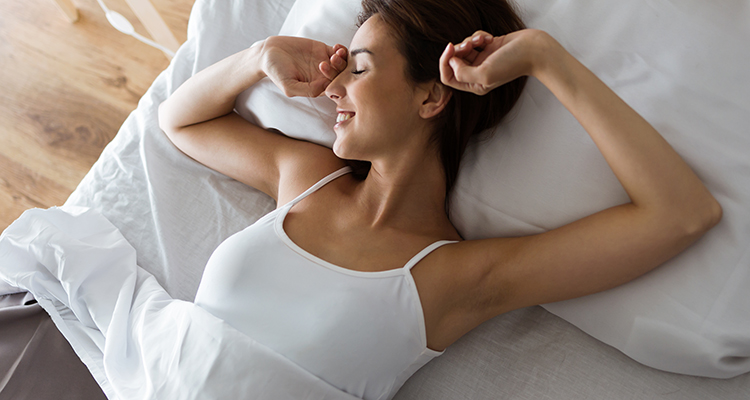
However, if you toss and turn all night, you may describe your sleep quality as “poor.” Thus, it is harder to measure sleep quality than it is to measure sleep quantity because sleep quantity is factual, while sleep quality is opinion-based. The good news is some guidelines can help determine your sleep quality, so you can set goals to improve it – if it is poor.
Listed below are criteria used to measure sleep quality:
- Sleep Latency
Sleep latency measures the length of time it takes for you to fall asleep. If you typically fall asleep within 30 minutes of going to bed, the quality of your sleep is most likely good.
- Sleep-Wake Cycles
Sleep-wake cycles measure the frequency of your wake-ups during the night. When you frequently awaken during the night, your sleep cycles and sleep quality are affected. If you rarely wake up at night or you only awaken once or twice a night, the quality of your sleep is fairly good.
- Wakefulness
Wakefulness measures the number of minutes you spend awake after you first try to go to sleep. If you experience more than 20 minutes of wakefulness; the quality of your sleep is likely fair to poor (depending on the length of time it takes you to fall asleep).
- Sleep Efficiency
Sleep efficiency measures the amount of time you spend sleeping. If you spend less than 85% of your night sleeping, the quality of your sleep is likely fair to poor.
Together, these four components measure the quality of your sleep. More specifically, they either provide you with a feeling of satisfaction or a feeling of dissatisfaction. Improving your sleep quality can ensure that your sleep cycles remain undisturbed. The result? A healed, refreshed, and energized you the next morning.
Can I Measure My Sleep Quality from Home?
Yes, you can.
To measure your sleep quality from home, you will need to answer the following questions about your sleep hygiene (sleep habits).

- How Long Does It Take for You to Fall Asleep?
Although the time it takes you to fall asleep each night may vary due to extenuating circumstances, if it takes more than 30 minutes to fall asleep, your sleep quality may be poor.
- Do You Awaken at Night?
If you spend more than 85% of your time awake at night, your sleep quality may be poor.
- How Long Does It Take You to Fall Back to Sleep Once Awakened?
Once awakened, it should not take more than 20 minutes to fall back to sleep. If it takes less than 20 minutes to fall back into your slumber, your sleep quality is likely good.
It is also important to consider your wake-up and daytime habits.
- Is it hard for you to get up in the mornings?
- Is it hard for you to stay awake and focused during the day?
- Do you tend to doze-off, daydream, or nap regularly?
A sleep diary can help you keep track of your sleep patterns. It can also help you identify what is keeping you up or waking you up at night, so you can take proactive steps to stop it. The good thing is you can take this sleep diary with you when you go to see your sleep specialist or doctor. This can help your health provider pinpoint the origin of your insomnia and develop a customized treatment plan for you, so you can finally get some sleep.
How Can I Calculate My Sleep Quality?
Well, to calculate your sleep quality you will need to first determine how long you actually sleep each night. Take this time (in minutes) and subtract the number of minutes it takes you to fall asleep. From that total, subtract the number of minutes it takes you to fall back to sleep once awakened. Divide this total (your actual sleep time) by the amount of time you spend in bed (in minutes). Lastly, multiply this total by 100. The total is your sleep efficiency score.
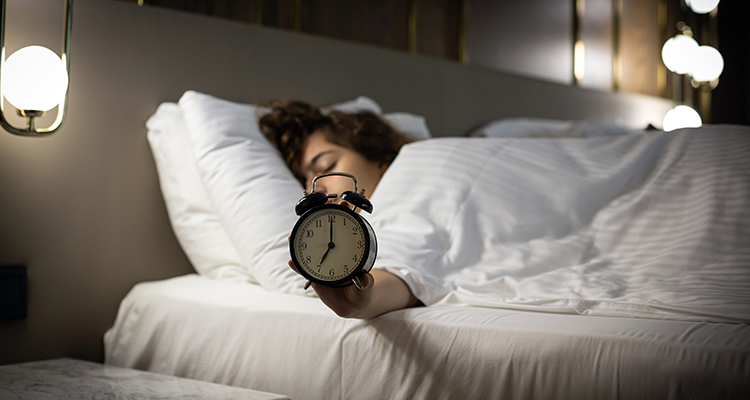
So, REM sleep can also be measured with electrooculography (EOG), an assessment used to determine how your sleep patterns and how long you stay in the REM sleep stage. Remember, dreaming occurs during the REM stage. While in the REM stage, your eyes make specific movements, which helps sleep specialists determine your REM sleep quality and the length of time you spend in this stage.
REM sleep can also be measured with “wearables” or devices you wear on your body to detect your sleep patterns, hygiene, and health. “Wearables” track your sleep stages throughout the night. Some common “wearables” that can help determine your REM sleep quality are Fitbit, Garmin, and Apple Watch.
Sleep studies can use various tools to measure REM sleep, such as:
- Electroencephalogram (EEG) measures your brain waves
- Electromyogram (EMG) measures your muscle function
- Electrooculogram (EOG) measures your eye movements
What is Poor Sleep Quality?
If it takes you longer than 30 minutes to fall asleep, if you awaken frequently during the night, and/or if it takes you longer than 20 minutes to go back to sleep upon waking, you are likely experiencing poor sleep quality.
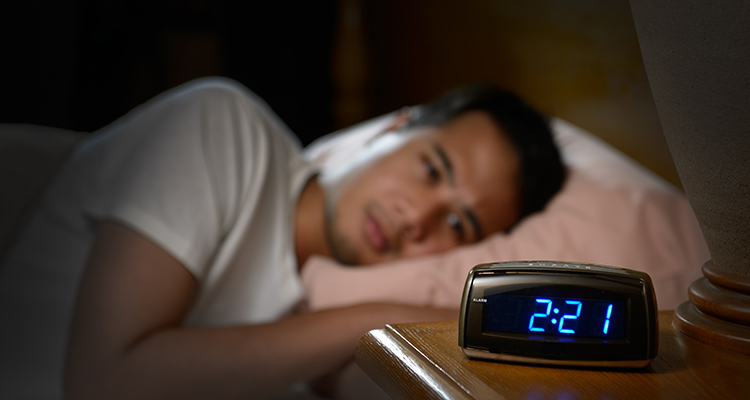
What does that mean? It means that you are not sleeping well at night. And, because you are not sleeping well, you are likely to feel sleepy and exhausted the next day – even if you sleep 7 to 8 hours the night before. Keep in mind, however, that your age, gender, stress level, and health play significant roles in how soundly or peacefully you sleep at night.
Note: As you age, the risk of frequent nighttime wake-ups increases for a variety of reasons, such as an increased need to urinate at night, nightmares or night terrors, anxiety, stress, depression, and/or mental or physical health woes.
How Can I Improve My Sleep Quality?
Studies suggest that sleep disorders, like insomnia, can reduce sleep quality. So, if you think you have a sleep disorder that is negatively affecting your sleep quality, it is important that you seek help from a qualified sleep specialist. A sleep specialist can measure your sleep quality and develop a customized treatment plan for you, so you experience restful and restorative sleep.
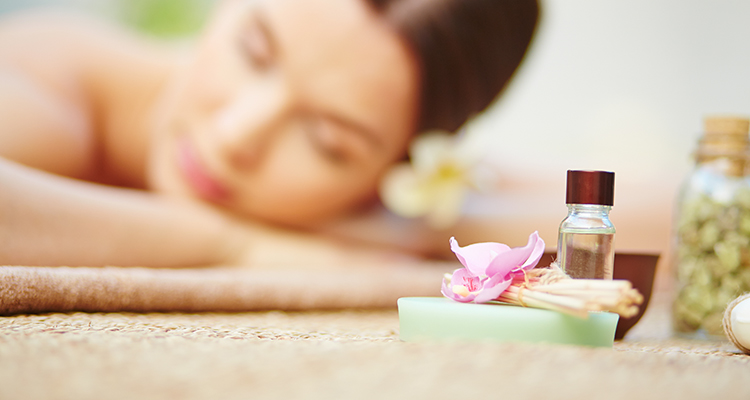
You can improve your sleep quality in the following ways:
- Researching your medication(s) side-effects – Some medications can contribute to poor sleep quality and insomnia. So, write down your medications, then google them or ask your doctor or pharmacist if one of the side-effects of your medication(s) is insomnia or sleep issues. If one of the side-effects is insomnia, ask your doctor if he or she can prescribe another medication that does not cause sleep issues
- Avoiding alcohol and caffeine a few hours before bed – Alcohol and caffeine are stimulants and diuretics, which means they can affect your sleep quality and keep you awake at night (i.e., potty breaks, racing thoughts, hyperactivity, and/or the jitters), especially if you consume them too close to bedtime. So, refrain from indulging in alcohol or caffeine several hours before bed.
- Darkening your bedroom – Darkness can trigger your natural production of melatonin, a hormone that helps you prepare for sleep each night. Light from a television, electronic devices, a night light, or ceiling light can disrupt your internal clock (circadian rhythm), delaying your melatonin production and release, preventing you from falling asleep, and lowering your sleep quality.
When your body is unable to produce and release melatonin, or if your body stops producing and releasing melatonin prematurely, it can cause you to awaken before time (nighttime wake-ups or too early morning wake-ups). Thus, the best way to combat this is to put up blackout curtains, remove all light sources, and/or use eye masks to block out extraneous lights.
- Using aromatherapy – Aromatherapy is an effective way to improve your sleep quality. Essential oils like lavender, jasmine, rose, chamomile, sweet marjoram, bergamot, and geranium can help you fall asleep quickly and stay asleep all night long.
- Avoiding sleeping pills – Although sleeping pills can help you fall asleep quickly, studies suggest that they can also reduce your sleep quality. Understand that the sleep you gain from sleeping pills is neither natural nor completely safe.
In fact, poor sleep quality combined with the next day’s drowsiness (commonly linked to sleeping pills), can make you feel as if you have been run over by a truck upon waking. So, whenever possible stick to natural sleep aids like sleep programs, a consistent bedtime routine, a comfortable bed, a cool bedroom, etc.
Investing in an online sleep program – Online sleep programs, like Somnus Therapy, can improve your sleep quality and help you get the sleep you need to function at an optimal level the next day. What is Somnus Therapy? It is a guided cognitive-behavioral therapy (CBT-i) program that teaches you how to conquer your insomnia, so you sleep better, faster, and longer.


